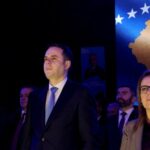The Kremlin is also closing the alliance’s liaison mission in Moscow. The announcement comes after NATO expelled eight members of the Russian mission to the military alliance.
Russian Foreign Minister Sergey Lavrov said Monday that his country is suspending its mission to NATO.
What did Lavrov say?
He said the move was a response to the expulsion of eight Russian staff at the military alliance’s mission last week. NATO said the individuals expelled were in fact “undeclared Russian intelligence officers.” The expulsions meant that half of the Moscow team were prohibited from working at NATO’s Brussels headquarters.
“As a result of NATO’s deliberate moves, we have practically no conditions for elementary diplomatic work and in response to NATO’s actions we suspend the work of our permanent mission to NATO, including the work of the chief military envoy,” said the foreign minister.
Lavrov, who complained that “NATO is neither interested in an equal dialogue nor in cooperation,” said staff at Russia’s NATO military mission in Moscow would also be stripped of their accreditation from November 1. If needed, he said, NATO could interact with Russia via its embassy in Brussels, Russian news agencies reported.
In response to the Monday announcement, a NATO spokesperson said: “We have taken note of Minister Lavrov’s comments to the media, however, we have not received any official communication on the issues he raised.”
German Foreign Minister Heiko Maas told DW that Russia’s decision to shutter its NATO mission make relations with Moscow more difficult. “We must acknowledge more and more that Russia no longer seems to be [willing to cooperate],” said Maas, who called the decision “more than just regrettable … It will seriously damage the relationship.”
In assessing the situation, former senior NATO official Jamie Shea told DW: “Of course, it’s easier if there are people in Brussels that they [NATO] could talk to. But given the poor state of the relationship, this does not make a major difference.
Shea, who served as deputy assistant secretary general for emerging security challenges at NATO until retiring in 2018, added: “These are two sides that haven’t really been talking to each other very much — certainly not at the working level. And of course, as Russia shows no sign of withdrawing from Crimea anytime soon — which was NATO’s condition to return to normal relations — this situation is likely to continue for a long time to come.”
What is the current state of NATO-Russia ties?
Practical cooperation between Russia and NATO was suspended in 2014, in response to Moscow’s annexation of the Crimean Peninsula. Nevertheless, the two have maintained open channels of communication to facilitate high-level military-to-military coordination.
The so-called NATO-Russia Council, too, has seldom met since relations between Russia and the West soured in the wake of Russian provocations, including its activities in Ukraine, its nuclear missile deployment, regular encroachments into NATO airspace and the harassment of NATO ships at sea./DW





